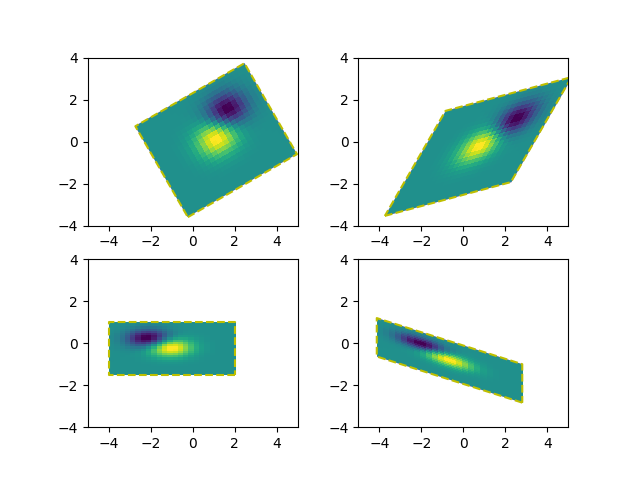Note
Click here to download the full example code
Affine transform of an image#
Prepending an affine transformation (Affine2D) to the data
transform of an image allows to manipulate the image's shape and
orientation. This is an example of the concept of transform chaining.
The image of the output should have its boundary match the dashed yellow rectangle.
import numpy as np
import matplotlib.pyplot as plt
import matplotlib.transforms as mtransforms
def get_image():
delta = 0.25
x = y = np.arange(-3.0, 3.0, delta)
X, Y = np.meshgrid(x, y)
Z1 = np.exp(-X**2 - Y**2)
Z2 = np.exp(-(X - 1)**2 - (Y - 1)**2)
Z = (Z1 - Z2)
return Z
def do_plot(ax, Z, transform):
im = ax.imshow(Z, interpolation='none',
origin='lower',
extent=[-2, 4, -3, 2], clip_on=True)
trans_data = transform + ax.transData
im.set_transform(trans_data)
# display intended extent of the image
x1, x2, y1, y2 = im.get_extent()
ax.plot([x1, x2, x2, x1, x1], [y1, y1, y2, y2, y1], "y--",
transform=trans_data)
ax.set_xlim(-5, 5)
ax.set_ylim(-4, 4)
# prepare image and figure
fig, ((ax1, ax2), (ax3, ax4)) = plt.subplots(2, 2)
Z = get_image()
# image rotation
do_plot(ax1, Z, mtransforms.Affine2D().rotate_deg(30))
# image skew
do_plot(ax2, Z, mtransforms.Affine2D().skew_deg(30, 15))
# scale and reflection
do_plot(ax3, Z, mtransforms.Affine2D().scale(-1, .5))
# everything and a translation
do_plot(ax4, Z, mtransforms.Affine2D().
rotate_deg(30).skew_deg(30, 15).scale(-1, .5).translate(.5, -1))
plt.show()
References
The use of the following functions, methods, classes and modules is shown in this example:
